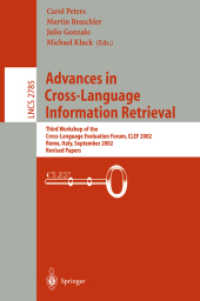Full Description
In Understanding Human Differences,readers are introduced to sound research grounded in various behavioral and social sciences while featuring a stimulating inquiry approach to support reflection on issues of critical importance in multicultural education in today's diverse society. The conceptual framework of the book focuses on three areas: culture, the individual, and institutions. Readers are encouraged to examine individual concerns; understand the cultural/historical contexts; and explore such areas as racism, classism, sexism, heterosexism, and ableism. Included is a focus on changes already achieved or that need to be implemented in schools and other areas of society to create a more just society.
Contents
Section 1Chapter 1 Understanding Ourselves and Others: Clarifying Values and LanguageChapter 2 Understanding Prejudice and Its CausesChapter 3 Communication, Conflict, and Conflict ResolutionSection 2: Cultural Foundations of Oppression in the United StatesChapter 4 Immigration and Oppression: The Assault on Cultural and Language DiversityChapter 5 Race and Oppression: The Experiences of People of Color in AmericaChapter 6 Religion and Oppression: The Struggle for Religious FreedomChapter 7 Rejecting Oppressive Relationships: The Logic of Cultural Pluralism for a Diverse SocietySection 3: Contemporary Dilemmas for Intergroup RelationsChapter 8 Racism: Confronting a Legacy of White Domination in AmericaChapter 9 Classism: Misperceptions and Myths About Income, Wealth, and PovertyChapter 10 Sexism: Where the Personal Becomes PoliticalChapter 11 Heterosexism: Transforming Homosexuality from Deviant to DifferentChapter 12 Ableism: Disability Does Not Mean InabilitySection 4: The Challenge of Diversity to American InstitutionsChapter 13 Pluralism in Schools: The Promise of Multicultural EducationChapter 14 Pluralism in Society: Creating Unity in a Diverse America








